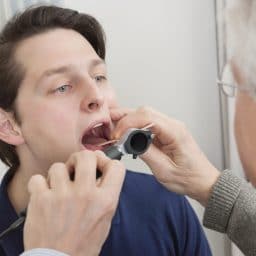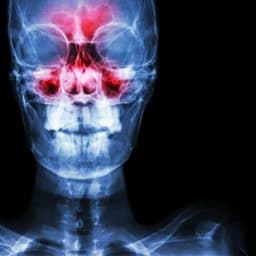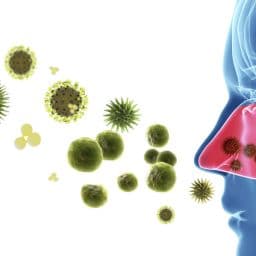What Are Salivary Glands?

Where Are Your Salivary Glands? The glands are found in and around your mouth and throat. We call the major salivary glands the parotid, submandibular, and sublingual glands. They all secrete saliva into your mouth, the parotid through tubes that drain saliva, called salivary ducts, near your upper teeth, submandibular under your tongue, and the…
Mouth Sores: Causes, Treatment, and Prevention

Insight into causes, treatment, and prevention What are fever blisters and cold sores? What are canker sores? When should a physician be consulted? and more… Oral lesions (mouth sores) make it painful to eat and talk. Two of the most common recurrent oral lesions are fever blisters (also known as cold sores) and canker sores….
What is Fungal Sinusitis?

What Is A Fungus? Fungi are plant-like organisms that lack chlorophyll. Since they do not have chlorophyll, fungi must absorb food from dead organic matter. Fungi share with bacteria the important ability to break down complex organic substances of almost every type (cellulose) and are essential to the recycling of carbon and other elements in…
Your Nose: The Guardian of Your Lungs

You might not think your nose is a “vital organ,” but indeed it is! To understand its importance, all that most people need to experience is a bad cold. Nasal congestion and a runny nose have a noticeable effect on quality of life, energy level, ability to breathe, ability to sleep, and ability to function…
Tips for Sinus Sufferers

Symptoms Of Sinusitis: Symptoms of upper respiratory infection lasting ten days or more Facial pressure or pain Nasal discharge that is yellow or green Post-nasal drip Cough At-Home Treatments For Sinusitis: Saline nasal sprays that moisturize the nasal cavity, reduce dryness, and help clear thick or crusty mucus Humidification (moisturizing the air) of living spaces…
Sinusitis: Special Considerations for Aging Patients

More than 20 percent of U.S. residents will be 65 or older in 2030. Of all Americans 65 and older, 14.1 percent report that they suffer from chronic sinusitis; for those 75 years and older, the rate declines to 13.5 percent. Geriatric Rhinitis Complaints Are: Constant need to clear the throat A sense of nasal…
Can Over-The-Counter Medications Help Sinus Pain?

Why Do We Suffer From Nasal And Sinus Discomfort? The body’s nasal and sinus membranes have similar responses to viruses, allergic insults, and common bacterial infections. Membranes become swollen and congested. This congestion causes pain and pressure; mucus production increases during inflammation, resulting in a drippy, runny nose. These secretions may thicken over time, may…
How Allergies Affect Your Child’s Ears, Nose and Throat

Your child has been diagnosed with allergic rhinitis, a physiological response to specific allergens such as pet dander or ragweed. The symptoms are fairly simple — a runny nose (rhinitis), watery eyes, and some periodic sneezing. The best solution is to administer over-the-counter antihistamine, and the problem will resolve on its own ….right? Not really…
Are We Through with Chew Yet?

As many as 20 percent of high school boys and two percent of high school girls continue to use smokeless tobacco, according to the Centers for Disease Control and Prevention. Despite public education campaigns sponsored by medical societies, organized baseball, and individuals, 12 to 14 million American users, one third are under age 21, and…
Antibiotics and Sinusitis

An antibiotic is a soluble substance derived from a mold or bacterium that inhibits the growth of other microorganisms. The first antibiotic was Penicillin, discovered by Alexander Fleming in 1929, but it was not until World War II that the effectiveness of antibiotics was acknowledged, and large-scale fermentation processes were developed for their production. Acute…